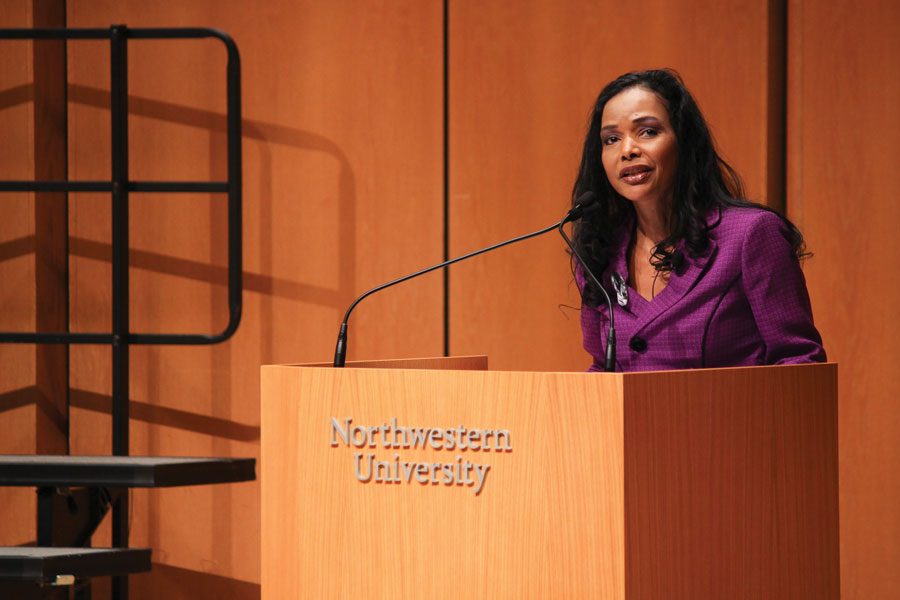Maggie Anderson speaks about research, economic equality in MLK keynote speech
Evan Robinson-Johnson/The Daily Northwestern
Maggie Anderson speaks at the University-wide MLK commemoration in Pick-Staiger Concert Hall Monday. Anderson discussed her research and advocated for economic equality in the black community
January 29, 2019
Maggie Anderson advocated for economic equality for the black community during Northwestern’s 2019 Dr. Martin Luther King Jr. Commemoration keynote speech Monday.
Anderson is the CEO of the Empowerment Experiment Foundation and author of the book “Our Black Year: One Family’s Quest to Buy Black in America’s Racially Divided Economy.” In her speech, she discussed her efforts to support black-owned businesses throughout the past 10 years and pushed forth the message Dr. King wished for in his last ever speech, “I’ve Been to the Mountaintop”: uniting for economic justice and empowerment.
“When we lift each other up, even when we need lifting ourselves, we cannot only see over the mountaintop; we move mountains,” Anderson said. “I’m going to go out fighting for this. Are you?”
The event, held in Pick-Staiger Concert Hall and attended by about 70 people, also featured musical performances by groups including Soul4Real a cappella. Medill Prof. Ava Thompson Greenwell, one of three co-chairs for the event, said Anderson was selected as the keynote speaker due to her ability to put emphasis on Dr. King’s economic dream. She said this dream is not considered enough.
“We wanted a speaker who could not only inspire but create a call to action,” Greenwell said. She added that she was confident in Anderson’s ability to do so because of her 2009 Empowerment Experiment, which Anderson described as the first ever real-life case study in self-help economics.
In that experiment, Anderson said her family dedicated themselves to what she said “proved our love for our hurting community” by only supporting black businesses and professionals for a year. She cited Barack Obama’s election as inspiration for the experiment, as well as the need she saw to “promote action, unity and dialogue about the black community’s economic disparity.”
After the 12 months, the Kellogg School of Management studied the data Anderson collected, which showed how supporting black-owned businesses could counter poverty, crime and other social crises that disproportionately impact black people, among other things.
“Together, Northwestern and my family made history,” Anderson said.
Anderson also acknowledged the challenges that came with “buying black.” She recalled being unable to purchase new clothes for daughters until five months into the experiment, when she finally found a black-owned retailer that sold toddler apparel. But Anderson refused to give up.
“Every time we disregard the gems that we have, we forget black-owned business and suppliers and we forget Dr. King,” she said. “We may remember him on his birthday, but we forget him and those who joined in his movement for the rest of the year.”
Suggesting ways the audience could act upon this issue, Anderson asked the crowd to “just support black-owned businesses a little more.” She said supporting one another, speaking out, standing up and asking questions was central to making change.
“It’s not that hard, and it’s not too late,” Anderson said at the event. She invited the audience to repeat this statement back to her.
While the keynote event was offered to both the NU and Evanston communities, Greenwell noted that for many years now, she has seen fewer and fewer students in the crowd.
However, she said she wants to remind students that “a rising tide lifts all boats.”
“When any segment of our population is not doing well, then all of us are not doing as well as we could be,” Greenwell said. “There are specific things that we can all do to balance the scale of economic inequality.”
Weinberg and Bienen first-year Sophia Jean was one of the few students who attended Anderson’s speech. She said it is “important to keep Dr. King’s legacy alive” as well as to have the conversations Anderson facilitates, “especially at a time when we are living in a polarized environment.”
“I hope this inspires the audience to constantly think more about different people’s identities,” Jean said. “What it really comes down to is the need to respect each other.”
Email: zoemalin2022@u.northwestern.edu
Twitter: @zoermalin
Related Stories:
– Activist who worked with Martin Luther King Jr. calls for ‘political justice’
– Annual Martin Luther King candlelight vigil features Q&A with former McDonald’s CEO



